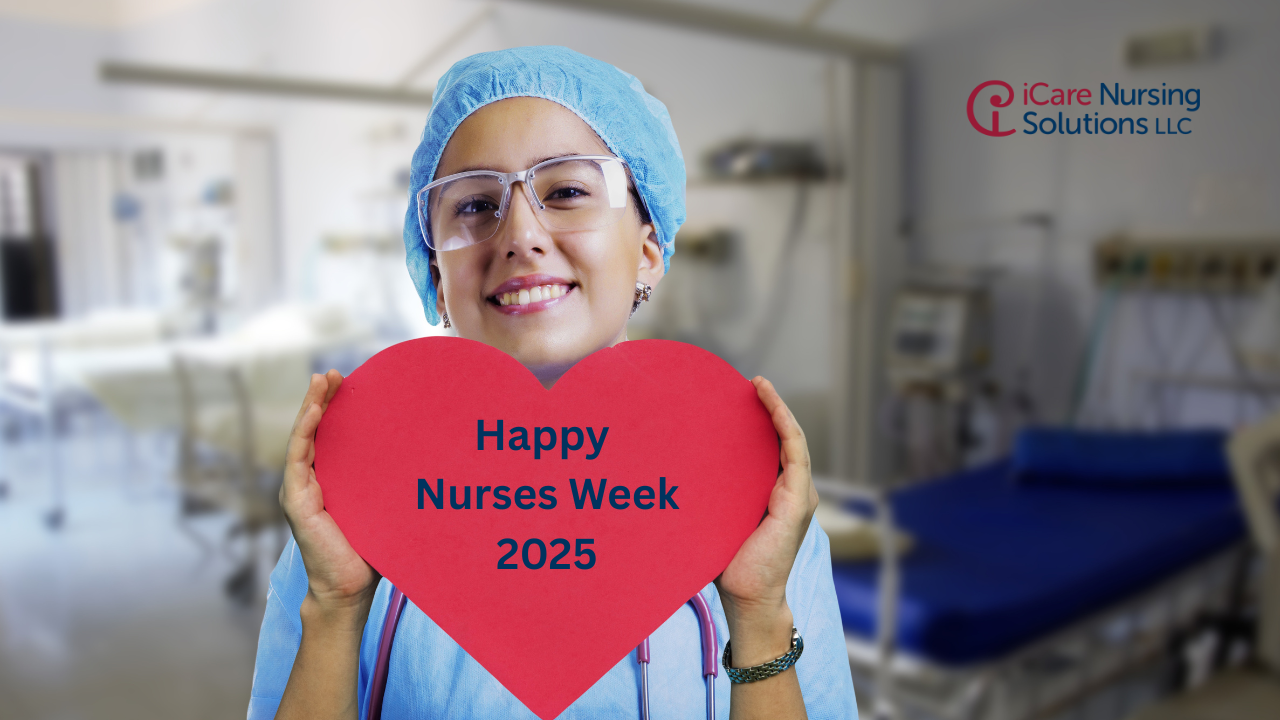Nursing Informatics Day is May 12th!

Nurses Week culminates every year on May 12th. May 12th is deemed Nursing Informatics Day!
Nursing Informatics is a specialty nursing practice that was formally recognized by the American Nurses Association in 1992. Three years later, Nursing Informatics began offering a specialty certification exam to eligible informatics nurses.
In my 20+ years in this field, I have seen tremendous growth and change to recognize the critical work that nurses do in designing, developing, testing, training, implementing and optimizing clinical information systems for use in healthcare delivery.
Nursing Informatics began long before 1992 with U.S. pioneers dating into the 1950's:
Breaking through the Technology Barrier as Nurses

First.... Cheers to Nurses Week 2025!
I am writing this on May 6th, 2025, the very first day of Nurses Week each year. Nurses Week is a special time of year where the work and efforts of nurses are highlighted in a variety of ways.
I remember being in nursing school and the Professors would use an overhead projector to write on the screen for us to take notes in our seats. They used markers that would wipe off with a wet paper towel and continue throughout the entire lecture with these transparencies (that is what they were called - if you know, you know (IYKYK :) ). We used microscopes in Anatomy and Physiology and Microbiology Exams. Health Assessment taught us how to use a stethoscope. We had calculators in our pockets to help with medication calculations on our clinical rotations.
The overhead projector, microscope, stethoscope and calculator may not have been thought of technology tools in nursing care delivery. However, they are technological solutions, that once were not ava...
Pointing and Clicking to the Next Level

Many years ago, after a go-live implementation, I recall feeling as though I was pointing and clicking much more than I was working on new projects and development efforts. I was missing the design and development efforts of the IT life cycle system.
I was looking for new challenges and growth within the field.
I was in the stabilization and maintenance phase of the IT implementation at that time. This is an essential aspect of the system development life cycle. However, at that time, I was looking to learn more, be challenged more, and do more of the complex puzzle piece work that I had come to really enjoy.
Within the next year, I found myself in a PhD program at Duke studying the meaning of knowing the patient and nurses' information needs before and after an electronic health record nursing documentation implementation.
I had definitely found my next level challenge!! (an understatement)
What I have come to find is that we go through plateaus and climbs in professional care...
Will Artificial Intelligence (AI) replace Nurses?

Artificial intelligence, commonly referenced as "AI" in conversation, is on the minds of everyone. There are many perspectives on what one expects will happen with the use of AI in society.
A question that I have been asked indirectly and directly is, "will AI replace nurses?"
At a keynote several months ago, I brought this question up. I spoke to the audience and said, "you want to know, will AI replace nurses? or When are the robots coming?"
The audience immediately showed signs that they were having these thoughts and concerns. Some smiles and laughs emerged as they recognized that I understood their concerns.
Well, before I answer that directly, I'd ask you to consider the foundations of nursing.
Nursing is the science of caring. The quality of care delivered to patients is highly dependent upon the way in which we know the patient and individualize care.
From a patient perspective, we want (and expect) to be known by our nurse to empathize with our care needs in the cont...
Nurses' use of Calculators and its Foreshadowing for Artificial Intelligence

How many of you rely on a calculator today for nursing practice?
I remember my calculator was a necessity for me each time I was preparing a pediatric medication during my years in direct care. I took care of hospitalized children and each medication was weight based dosing. The calculator, in partnership with my Lexi Comp pediatric dosing guide, were essentials for me. I could not function without those items. I also needed my stethoscope and pen to be an effective nurse.
While I began my RN journey in 2000, just a decade earlier there were articles published that were investigating whether nurses should be using calculators or not in practice. One article entitled, "Should Nurses Carry Calculators?" (from conference proceedings in 1998), investigated the role of calculators for nursing care delivery.
The abstract starts with these two sentences, "It has been a widespread tradition of nurse education establishments to forbid the use of hand-held calculators in examinations of m...
Technology in Healthcare is here to Stay

Technology in healthcare is here to stay. I have spoken to hundreds, maybe thousands now, of nurses and healthcare professionals across the globe about healthcare, nursing, technology and more.
A common concern I hear and can see is the concern of technology's role in healthcare. "It is not nursing", is something I have heard through the years. "It gets in the way of working with patients" or "Patients think I am not working when I am on a device". Other common concerns are related to documentation burden, accessibility of information, and difficulties with using aspects of the technology.
Now, with the emergence and attention of artificial intelligence (AI) tools for use in healthcare and the overarching concern of the potential for bias, inaccuracies, lack of transparency and a general need to understand how the technology works, the concern is greater.
So, how do we as a profession become ready, forward thinking, and proactive in preparation for new AI tools?
Well, let us lo...
Artificial Intelligence or Augmented Intelligence?

Hello All!
I hope you all have had a restful and enjoyable holiday weekend. The 4th of July weekend brings many memories for me over the years. In the last few years, I have come to really enjoy the month of July.
July also marks the start of the second half of the year.
Something that I have seen continue to be a focal discussion point over the last six months has been the potential and/or anticipated use of artificial intelligence (AI) in healthcare.
Artificial Intelligence is already here. You may likely be using it in your daily life and not even realize it. In this week's iCare about Health Tech podcast, Episode 10: Artificial Intelligence or Augmented Intelligence?, I reference the popular driving app, Waze.
In the episode I provide some examples as to how the insights that app provides while driving influences my decision making abilities more effectively than if I did not have access to that app.
I am still the driver but I have an augmented experience with the ass...
Embracing Technology in Nursing

Happy June all!
Over the last few weeks, I have noticed an increase in questions and curiosity around the use of technology in nursing and healthcare.
Twenty years ago, we were largely on paper and technology was perceived to some extent as a foreign entity that was not necessarily "part" of nursing. We had operated on paper to document, to manage medications, to check orders and more.
However, today in 2024, the vast majority of health centers, systems, practices, and organizations are using digital tools for patient record management, medication management, labs, radiology and more.
One can no longer separate nursing and healthcare from the dependency on technology.
However, I would like to have you reflect on the stethoscope for a moment. Would you consider that to be a technology?
The stethoscope was invented to standardize the assessment of patient heart, lung and bowel sounds across healthcare professionals. Prior to its invention, one relied on one's own auditory abil...
Nursing Informatics Day is May 12th!

Cheers to May 12th!
Today, May 12th, is recognized as Nursing Informatics Day by the American Nurses Association (ANA). Consider how special it is that Informatics Nursing gets a day of recognition during nurses week. For a specialty that was officially recognized in 1992, informatics continually makes an impact across the profession and beyond. Nursing Informatics Day was officially recognized in 2008, 16 years ago.
May 12th is also recognized as International Nurses Day recognized by the International Council of Nurses. May 12th marks the last day of National Nurses Week. The significance of the day is that it is Florence Nightingale's date of birth.
Florence Nightingale was a visionary of nursing in many ways, including the specialty practice of informatics.
Over the last week, I had several conversations about nursing, informatics, the future, the past, and how to integrate it all together in a meaningful way. This can seem overwhelming at times.
However, it is also excitin...
2024 is the 30th Anniversary of National Nurses Week!

Today is May 6th and it marks the start of another year of National Nurses Week in the United States!
As I thought about Nurses Week, I wondered, what is the history of this week for our profession?
As a nurse of now 24 years, I have always had National Nurses Week. However, it was not long before that where there was not such a celebratory week recognizing the efforts and talents of the nurses across the country.
According to the American Nurses Association's history of Nurses Week, it was in 1993 when the ANA Board of Directors designated May 6th - May 12th as National Nurses Week for 1994 and beyond!
Thus, 2024 would mark 30 years of continued celebrations.
As nurses who have an interest, curiosity, or are currently working in health information technology and/or informatics, you may also be interested to know that the first board certification exam for informatics nursing was offered right around that time in 1995 (and recognized as a specialty practice in 1992)!
The ear...
